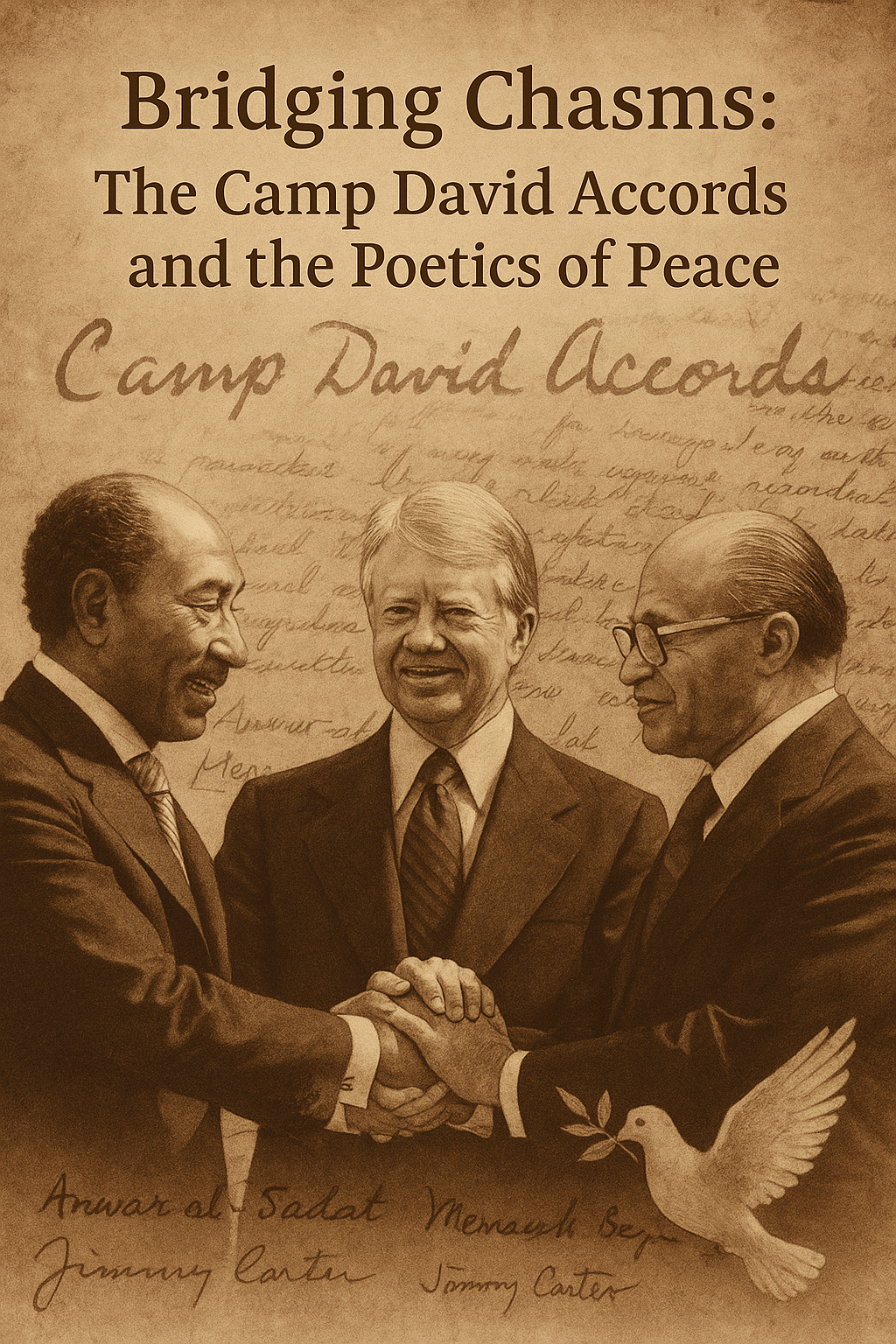The Fragility of Peace
In September 1978, the wooded seclusion of Camp David in Maryland bore witness to one of the most audacious attempts at peace in modern history. For thirteen tense days, Egyptian President Anwar Sadat, Israeli Prime Minister Menachem Begin, and U.S. President Jimmy Carter confronted decades of war, hatred, and grief. The Middle East, scarred by four wars since the founding of Israel in 1948, stood as a powder keg—a place where religion, land, and identity collided with devastating consequences.
The Camp David Accords emerged as a framework for peace that changed the trajectory of Egyptian-Israeli relations. Yet beneath the political negotiations lay the beating hearts of men shaped by loss, faith, ambition, and an unyielding sense of history’s weight. As Sadat himself declared,
“Peace requires respect for the sovereignty, territorial integrity and political independence of every state in the area and their right to live in peace within secure and recognized boundaries free from threats or acts of force.”
– (Camp David Accords, Government of the Arab Republic of Egypt)
But the story of Camp David is not merely a political narrative—it is, at its core, a profoundly human one.
Carter, Sadat, Begin: Three Men, Three Histories
President Jimmy Carter, driven by faith and a moral conviction that diplomacy was sacred work, believed God had placed him in office to bring peace to the Holy Land. Egyptian President Anwar Sadat, haunted by wars and emboldened by courage, risked everything—including, ultimately, his life—for a peace many in the Arab world considered betrayal. Israeli Prime Minister Menachem Begin, a Holocaust survivor turned hardline statesman, carried the weight of Jewish history on his shoulders and sought a future where Israel could exist without fear of annihilation.
As historian Lawrence Wright notes in Thirteen Days in September:
“Sadat, in many ways when he signed the Camp David Accords, signed his death warrant, and it was ironic.”
On October 6, 1981, Sadat was assassinated by extremists enraged at his peace with Israel. Yet his legacy lives on in the treaty that ended thirty-one years of war.
The Accords: Words as Architecture
The Camp David Accords called for:
- Israel’s withdrawal from the Sinai Peninsula
- Diplomatic recognition between Egypt and Israel
- A five-year transitional period for Palestinian self-governance in the West Bank and Gaza
- Future negotiations involving Jordan and Palestinian representatives
The accords also invoked U.N. Resolution 242, demanding “the right of every state in the area to live in peace within secure and recognized boundaries.”
But as Professor Zbigniew Brzezinski observed:
“Peace had to come from the outside. Each side viewed the other with hostility, unable to take the initiative alone.”
The Language of Healing
At its essence, Poetic Bipolar Mind seeks to transform personal and collective wounds into testimony, art, and ultimately, connection. Like the Accords, our work begins in fracture—mental illness, loss, trauma, silences—and reaches toward understanding.
The Camp David negotiations mirrored the emotional landscapes explored in our poetry:
- Conflict: Internal wars echo the external ones fought in deserts and cities.
- Silence: The white spaces in our poems resemble the long, tense pauses between Carter shuttling proposals from one cabin to another.
- Healing: Just as Sadat and Begin dared to imagine peace, our writing dares to envision wholeness after devastation.
Peace, like poetry, is crafted in vulnerability.
Why It Still Matters
Decades later, the Camp David Accords remind us that progress often comes through imperfection. The Palestinian question remained unresolved; Arab states denounced Egypt; Sadat paid with his life. Yet the peace between Egypt and Israel endures—a fragile testament to what dialogue can achieve even amid betrayal, fear, and grief.
In a world fractured by wars—both external and internal—the accords echo as both history and metaphor: that the human spirit, however scarred, carries the capacity to choose reconciliation over ruin.
Bibliography
“Camp David Accords Signed – Sep 17, 1978 – HISTORY.Com”. HISTORY.Com, 2010, http://www.history.com/this-day-in-history/camp-david-accords-signed.
Government of the Arab Republic of Egypt , et al. “Camp David Accords .” Israel Ministry of Foreign Affairs , http://www.mfa.gov.il/mfa/foreignpolicy/peace/guide/pages/camp%20david%20accords.aspx. Accessed 25 Mar. 2017.
Kāmil, Muḥammad Ibrāhīm. The Camp David Accords : A Testimony. London ; Boston : KPI ; Boston, Mass., USA : Routledge & Kegan Paul, 1986.
“In dealing with ISIS, Obama could take cues from the Camp David Accords.” PRI’s The World, 1 Oct. 2014. Literature Resource Center, go.galegroup.com/ps/i.do?p=LitRC&sw=w&u=valh61524&v=2.1&id=GALE%7CA384666905&it=r. Accessed 20 Mar. 2017.
“Interview: Zbigniew Brzezinski discusses his participation in and reflections on the 1978 Camp David accords reached by Egypt and Israel.” Talk of the Nation, 16 Sept. 2003. Literature Resource Center, go.galegroup.com/ps/i.do?p=LitRC&sw=w&u=valh61524&v=2.1&id=GALE%7CA162142055&it=r. Accessed 20 Mar. 2017.
“Milestones: 1977–1980 – Office Of The Historian”. History.State.Gov, 2017, https://history.state.gov/milestones/1977-1980/camp-david.
Wright, Lawrence. Thirteen Days In September: The Dramatic Story Of The Struggle For Peace. 1st ed., Knopf Doubleday Publishing Group, 2014.
“’13 Days In September’ Examines 1978 Camp David Accords.” Morning Edition, 16 Sept. 2014. Academic OneFile





Leave a Reply